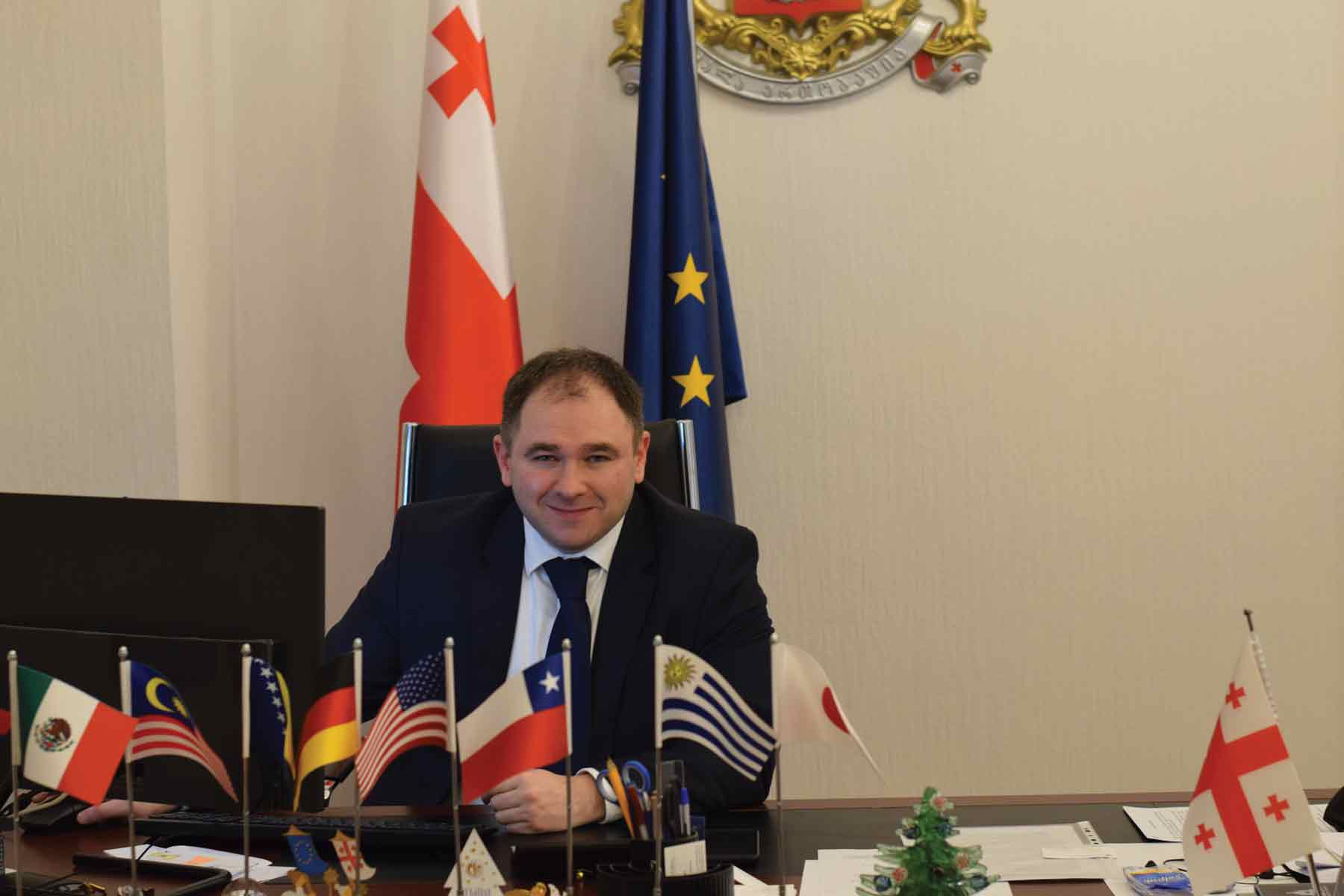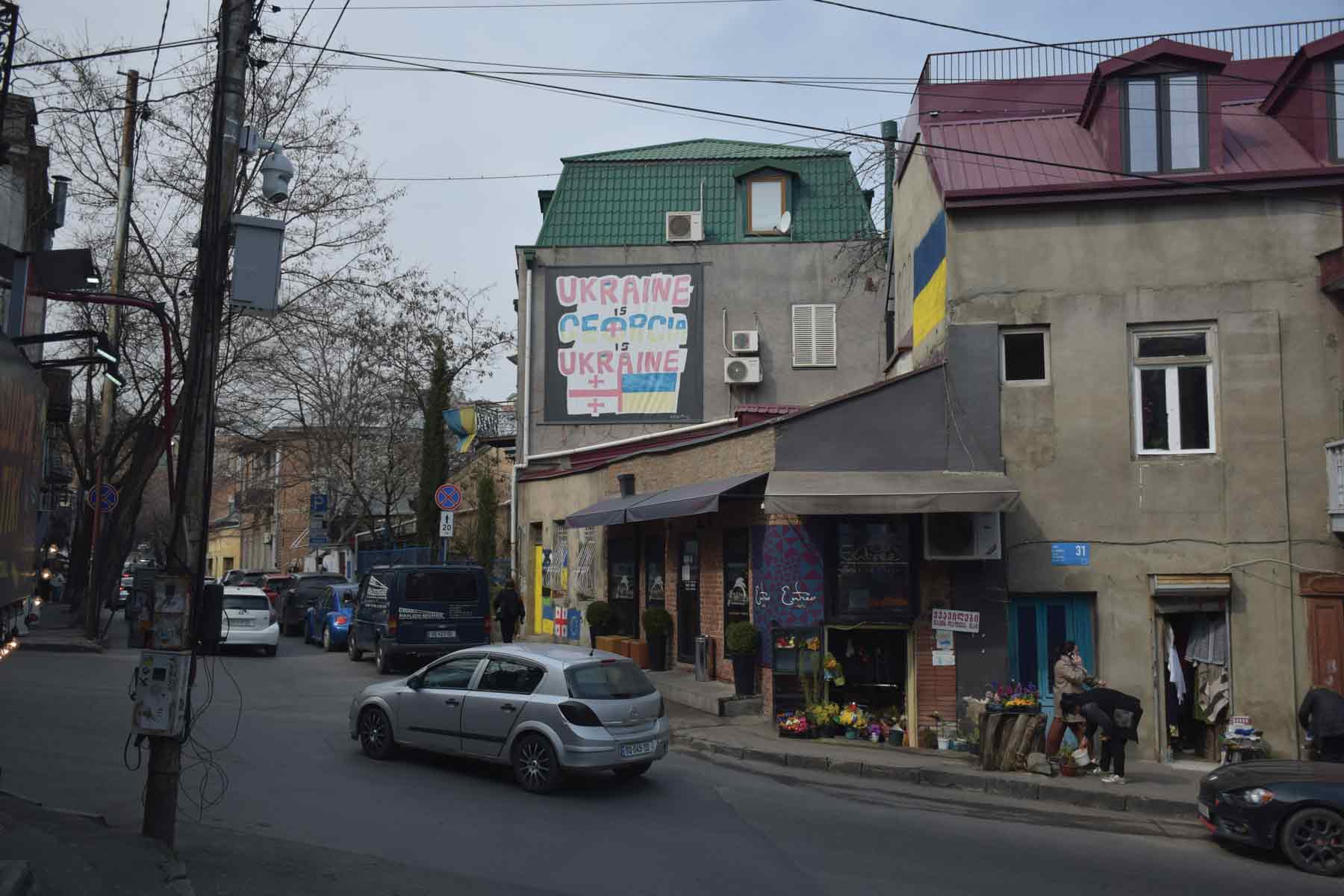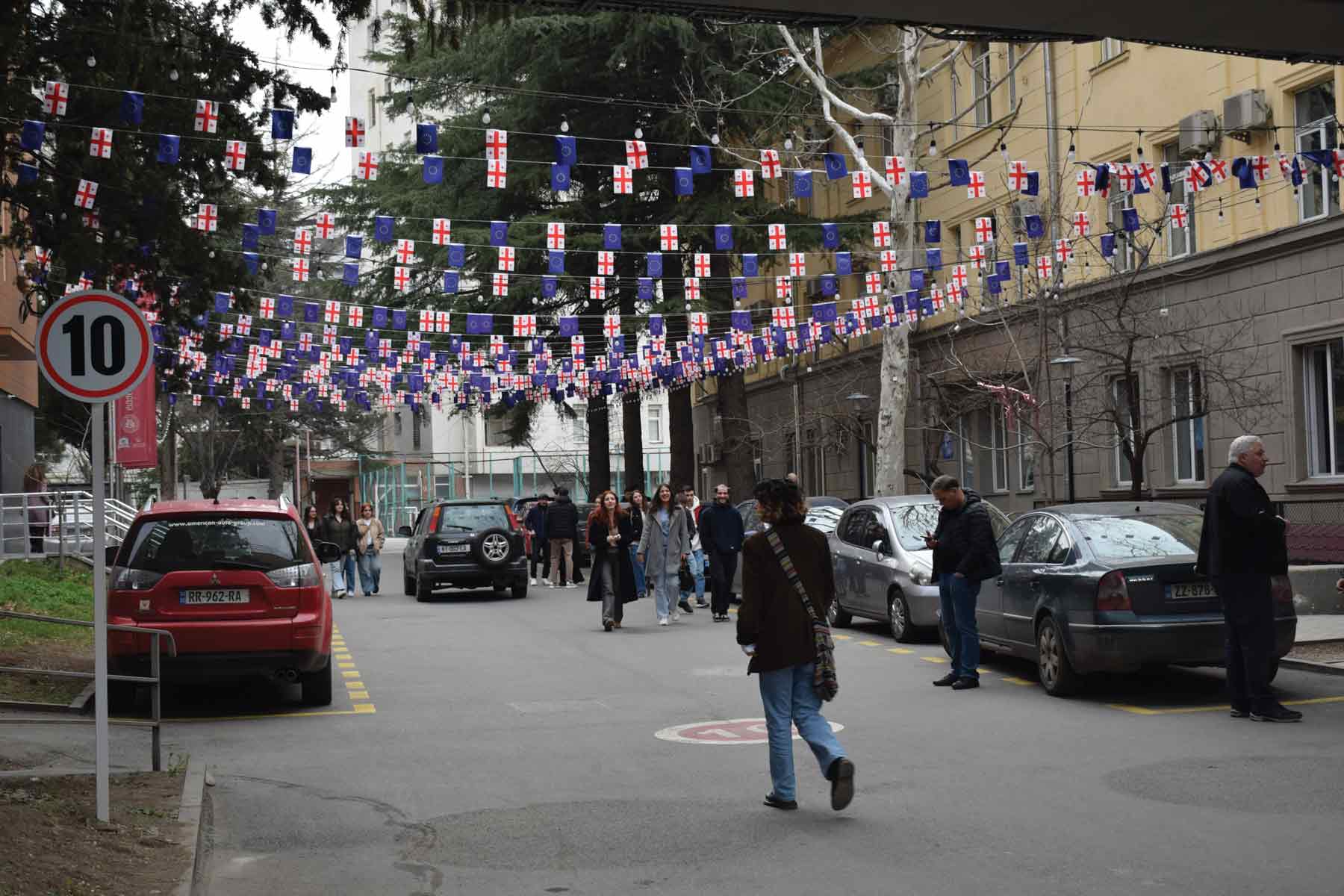Zhana Odiashvili, 29, was far from surprised when she learned about Russia’s full-scale invasion of Ukraine two years ago. The news footage of the war felt eerily similar to something she had once experienced.
Growing up close to Russian-occupied territory, Odiashvili once had to leave everything behind to escape Russian shelling.
“This was 15 years ago but it feels more like 15 days. The trauma is still there,” she tells The Parliament in the Georgian capital of Tbilisi. Odiashvili is referring to the 2008 Russo-Georgian War – a brief but intense conflict, fought primarily over the breakaway regions of South Ossetia and Abkhazia.
For most of that year, Odiashvili and her family had become used to artillery shells being traded between separatist forces and the Georgian military across the frontline. But when warplanes started dropping bombs in the village where they were spending the summer, her parents realised that staying put could mean a death sentence.
Not having a car, and with no time to pack their belongings, the family managed to hitch a ride out. At first, they headed back to their hometown, Gori, but with Russian tanks quickly closing in, they were forced to escape to Tbilisi.
“I was just 14 or 15 years old, but it was a big psychological shock for me,” Odiashvili says. “Nobody knew what was going on, and we did not know when we could return or if our house would still be there.”
Odiashvili’s hometown remained occupied for another month. But she considers herself lucky: unlike most who escaped, her family was eventually able to return home. The war became a turning point in her life.
Divided opposition
“This is when I understood how important politics can be,” she says. To her, Georgia’s parliamentary election in October of this year will be a pivotal moment in the country’s history: “For us to ever join the European Union, the government needs to go.”
Current polling predicts a landslide victory for the ruling Georgian Dream party, led by Prime Minister Irakli Kobakhidze, who assumed the post in February. And with a five per cent threshold to enter parliament, the dozen smaller parties opposing the government are likely to be left out of the legislature, leaving only one party – the centre-right United National Movement – to stand against the centre-left Georgian Dream.
 Georgian Dream MP Nikoloz Samkharadza believes his country will be a full EU member by 2030.
Georgian Dream MP Nikoloz Samkharadza believes his country will be a full EU member by 2030.
That is, unless the opposition runs on a joint list. According to David Aprasidze, professor of political science at Ilia State University in Tbilisi, there are signs pointing towards such a formation. At the moment, though, he describes the opposition as incredibly divided.
“They would not stand a chance if the elections were held this month. Not because of the government’s popularity, but because of the low trust in the opposition,” Aprasidze says.
To make matters more complicated, the war in Ukraine has caused a deep rift between the government and the president, Salome Zourabichvili, an independent and one of Georgia’s most pro-European politicians. She now regularly criticises the ruling party for appeasing Russia and drifting away from Europe.
‘Anything could happen’
“The president’s potential role in the elections is interesting,” Aprasidze continues, explaining there is a growing expectation that Zourabichvili could emerge as a contender to lead a government in a newly formed centrist block that could attract more voters. For this to happen, though, Zourabichvili would need to resign as president – something she has said she is not interested in doing.
Georgian politics is notoriously unpredictable, but Aprasidze’s bet is that the president will keep her word and not become an active part of the opposition. “But anything can happen. A breakthrough in Ukraine or widespread protests in Georgia could become a catalyst for the opposition, and that changes calculations dramatically,” he says.
Georgian Dream has been in power since 2012. It was founded by multi-billionaire oligarch Bidzina Ivanishvili, who made his riches in Russia after the collapse of the Soviet Union. His assets are estimated to be worth $6.2bn, about one-third of Georgia’s gross domestic product.
Everyone has to fight for this goal, but we have paid with our blood for long enough.
While Georgian Dream positions itself as pro-Western, its opposition routinely accuses the party of merely putting up a facade and instead working to appease Moscow.
Last year, Georgians protested a proposed law that would require NGOs to register as ‘agents of foreign influence.’ The bill, which was later retracted, was commonly dubbed the ‘foreign agent law’ and likened to existing legislation in Russia. The bill would have subjected organisations that received at least 20 per cent of their funding from abroad to “onerous reporting requirements, inspections, and administrative and criminal liability, including up to five years in prison for violations,” according to Human Rights Watch.
Earlier this year, a new bill was proposed that, according to the Georgian Dream’s executive secretary, would “protect society from pseudo-liberal ideology and its inevitable harmful consequences.” A similar law was implemented in Russia two years ago.
To Zhana Odiashvili, it is remarkable how the government brands itself as pro-European yet insists on mimicking Russian legislation. However, despite her staunch opposition to the ruling party, she sees the current alternatives as increasingly divided and lacking a clear strategy on how to win the election. At the moment, she only knows that she plans to vote against the government, but not for which opposition party.
A future in the EU
Still, Georgians across the political spectrum seem to broadly share the sentiment that Georgia’s future is with the West.
According to recent surveys by the International Republic Institute, one of the largest polling organisations in Georgia, 86 per cent of Georgians fully or somewhat support their country joining the European Union. Approval ratings this high would make most EU member states jealous.
Back in Tbilisi, the ruling party insists that EU membership has been a top priority ever since the country was granted candidate status in December last year.
The decision was made on the understanding that Georgia would fulfil nine mandatory steps, including aligning with EU common foreign policy, addressing political polarisation, ensuring a free and fair election, reforming the judiciary, and improving the protection of human rights.
For us to ever join the European Union, the government needs to go.
Nikoloz Samkharadze is one of the politicians working closely on the issue. Previously a professor in international relations at Tbilisi State University, he now heads the Georgian parliament’s Foreign Relations Committee as an MP with the Georgian Dream party.
In Samkharadze’s view, Georgia is already working on implementing the criteria and will be a full EU member by 2030. But he adds that “this is just the beginning of the road” – the next big step will be in December when Brussels is expected to take a decision on whether to open full membership negotiations.
Support for Ukraine
To Samkharadze, the most intractable issue to overcome is political polarisation. He considers it natural for polarisation to increase during an election year. But, more importantly, he sees this EU criteria as too vague to act on.
“I can say openly that I don’t think it should be a point at all,” he says, arguing that it’s not measurable. “How do we understand the scale of polarisation, and where does Georgia stand on this scale?”
A recurring theme among Georgians critical of the government is that not enough is being done to support Ukraine in its war against Russia. But Samkharadze insists that his country remains deeply supportive of Ukraine and is doing its part, noting that Georgia has taken in 30,000 Ukrainian refugees and was one of 38 countries to appeal to the International Criminal Court to issue an arrest warrant for Russian President Vladimir Putin.
 Slogans in support of Ukraine are visible across Tbilisi but the Georgian government has yet to implement any sanctions against Russia.
Slogans in support of Ukraine are visible across Tbilisi but the Georgian government has yet to implement any sanctions against Russia.
“Our opponents are always saying that Georgia is not doing enough to support Ukraine,” he says. “But what else can we do?”
Samkharadze says the reasons Georgia has not implemented sanctions against Russia are economic. “From the very beginning, we have said that we cannot impose bilateral sanctions on Russia,” he continues, arguing that such a move would significantly hurt Georgia, while having little impact on Russia.
Samkharadze also questions the criticism of the ‘foreign agent law,' saying that it differs significantly from the Russian one. He likens it to a recently proposed bill put forward by the European Commission, which would require lobbying activities on behalf of non-EU countries to be made available in a public register.
Pressure to show progress
So, how close is Georgia to fulfilling the criteria and joining the union?
According to Natalie Sabanadze, a former Georgian ambassador and head of the country’s mission to the EU, Georgia was closer to joining the EU two or three years ago than it is now. “It is a bit paradoxical, but then Georgia was much better placed. Now relations are frostier than I ever remembered,” she says.
But there could be future progress. Sabanadze, who is currently a senior fellow at Chatham House in London, sees the proposed 2030 deadline for the year of accession as achievable, although argues that it largely depends on outside factors, such as the war in Ukraine and sustained momentum in Brussels for enlargement, rather than on action from Tbilisi.
 Street decorations at Ilia State University in Tbilisi celebrate Georgia’s accession to EU candidate state status.
Street decorations at Ilia State University in Tbilisi celebrate Georgia’s accession to EU candidate state status.
At the same time, Sabanadze notes there is pressure on Georgia to show progress, not least on judiciary reform, where she sees a growing tendency for officials to abuse power, and on reducing polarisation.
“There are conscious decisions being taken now to not accept interviews from opposition TV channels,” she says. “Increase the space for dialogue, stop condoning violence and don’t dismantle independent institutions. Start ticking these things off, and you have a result.”
Reducing polarisation
Some Georgians believe that reducing polarisation could be a unifying effort that the country should capitalise on.
Two such individuals are Giorgi Khvedeliani and Nona Mamulashvili. Khvedeliani previously worked closely with former President Mikheil Saakashvili and Mamulashvili worked as a member of parliament affiliated with the United National Movement between 2020 and 2022.
In 2022, both left party politics and founded Gamziri, a civic platform that aims to reduce polarisation in society and bring Georgians together.
“For us, the major thing is to advocate our European and Euro-Atlantic path,” says Khvedeliani. “We organise our campaign to show that on the big topics, everyone is actually on the same page.”
86 per cent of Georgians fully or somewhat support their country joining the European Union.
This is done by documenting what they describe as “pivotal moments” in modern Georgian history that reassured its sovereignty, including a deadly pro-independence rally in 1989, the war with Russia in 2008 and last year’s widespread protests in March against the so-called foreign agent law, which eventually was withdrawn.
The foundation collects symbolic items from these events, such as the house keys of a man who had to flee occupied territory and the army patch of a soldier who was tortured and killed on video by pro-Russian separatists. Exhibitions featuring these items were shown at the European Parliament last June.
Both Khvedeliani and Mamulashvili keep returning to one pressing issue: the only real threat Georgians should be concerned about is their neighbour to the north. And for Mamulashvili, this is personal. Her brother, Mamuka, has been fighting Russian soldiers in Ukraine since 2014 as commander of the Georgian Legion.
Appealing to Brussels to prioritise Georgia’s accession to the union, she argues that it is a matter of security for all of Europe, and not only Georgia. “Everyone has to fight for this goal, but we have paid with our blood for long enough,” she says.
Sign up to The Parliament's weekly newsletter
Every Friday our editorial team goes behind the headlines to offer insight and analysis on the key stories driving the EU agenda. Subscribe for free here.